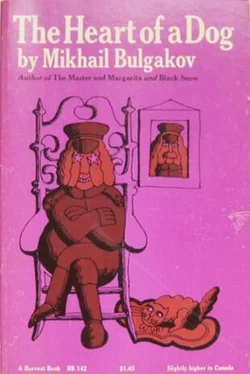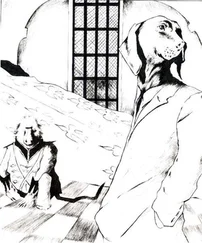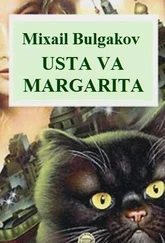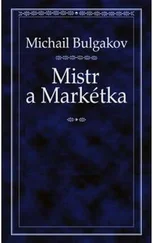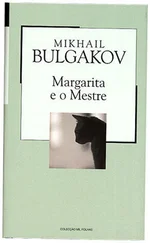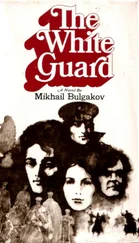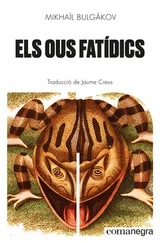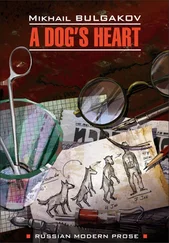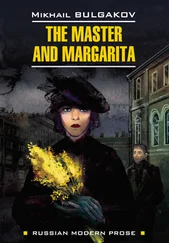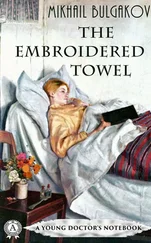‘But the proletarians don’t have any galoshes, Philip Philipovich,’ stammered the doctor.
‘Nothing of the sort!’ replied Philip Philipovich in a voice of thunder, and poured himself a glass of wine. ‘H’mm… I don’t approve of liqueurs after dinner. They weigh on the digestion and are bad for the liver… Nothing of the sort! The proletarians do have galoshes now and those galoshes are — mine! The very ones that vanished in the spring of 1917. Who removed them, you may ask? Did I remove them? Impossible. The bourgeois Sablin?’ (Philip Philipovich pointed upwards to the ceiling.) ‘The very idea’s laughable. Polozov, the sugar manufacturer?’ (Philip Philipovich pointed to one side.) ‘Never! You see? But if they’d only take them off when they come up the staircase!’ (Philip Philipovich started to turn purple.) ‘Why on earth do they have to remove the flowers from the landing? Why does the electricity, which to the best of my recollection has only failed twice in the past twenty years, now go out regularly once a month? Statistics, Doctor Bormenthal, are terrible things. You who know my latest work must realise that better than anybody.’ ‘The place is going to ruin, Philip Philipovich.’
‘No,’ countered Philip Philipovich quite firmly. ‘No. You must first of all refrain, my dear Ivan Arnoldovich, from using that word. It’s a mirage, a vapour, a fiction,’ Philip Philipovich spread out his short fingers, producing a double shadow like two skulls on the tablecloth. ‘What do you mean by ruin? An old woman with a broomstick? A witch who smashes all the windows and puts out all the lights? No such thing. What do you mean by that word?’ Philip Philipovich angrily enquired of an unfortunate cardboard duck hanging upside down by the sideboard, then answered the question himself. ‘I’ll tell you what it is: if instead of operating every evening I were to start a glee club in my apartment, that would mean that I was on the road to ruin. If when I go to the lavatory I don’t pee, if you’ll excuse the expression, into the bowl but on to the floor instead and if Zina and Darya Petrovna were to do the same thing, the lavatory would be ruined. Ruin, therefore, is not caused by lavatories but it’s something that starts in people’s heads. So when these clowns start shouting “Stop the ruin!” — I laugh!’ (Philip Philipovich’s face became so distorted that the doctor’s mouth fell open.) ‘I swear to you, I find it laughable! Every one of them needs to hit himself on the back of the head and then when he has knocked all the hallucinations out of himself and gets on with sweeping out backyards — which is his real job — all this “ruin” will automatically disappear. You can’t serve two gods! You can’t sweep the dirt out of the tram tracks and settle the fate of the Spanish beggars at the same time! No one can ever manage it, doctor — and above all it can’t be done by people who are two hundred years behind the rest of Europe and who so far can’t even manage to do up their own fly-buttons properly!’
Philip Philipovich had worked himself up into a frenzy. His hawk-like nostrils were dilated. Fortified by his ample dinner he thundered like an ancient prophet and his hair shone like a silver halo.
His words sounded to the sleepy dog like a dull subterranean rumble. At first he dreamed uneasily that the owl with its stupid yellow eyes had hopped off its branch, then he dreamed about the vile face of that cook in his dirty white cap, then of Philip Philipovich’s dashing moustaches sharply lit by electric light from the lampshade. The dreamy sleigh-ride came to an end as the mangled piece of roast beef, floating in gravy, stewed away in the dog’s stomach.
He could earn plenty of money by talking at political meetings, the dog thought sleepily. That was a great speech. Still, he’s rolling in money anyway.
‘A policeman!’ shouted Philip Philipovich. ‘A policeman!’
Policeman? Ggrrr… — something snapped inside the dog’s brain.
‘Yes, a policeman! Nothing else will do. Doesn’t matter whether he wears a number or a red cap. A policeman should be posted alongside every person in the country with the job of moderating the vocal outbursts of our honest citizenry. You talk about ruin. I tell you, doctor, that nothing will change for the better in this house, or in any other house for that matter, until you can make these people stop talking claptrap! As soon as they put an end to this mad chorus the situation will automatically change for the better.’
‘You sound like a counter-revolutionary, Philip Philipovich,’ said the doctor jokingly. ‘I hope to God nobody hears you.’
‘I’m doing no harm,’ Philip Philipovich objected heatedly. ‘Nothing counter-revolutionary in all that. Incidentally, that’s a word I simply can’t tolerate. What the devil is it supposed to mean, anyway? Nobody knows. That’s why I say there’s nothing counter-revolutionary in what I say. It’s full of sound sense and a lifetime of experience.’
At this point Philip Philipovich pulled the end of his luxurious napkin out of his collar. Crumpling it up he laid it beside his unfinished glass of wine. Bormenthal at once rose and thanked his host.
‘Just a minute, doctor,’ Philip Philipovich stopped him and took a wallet out of his hip pocket. He frowned, counted out some white 10-rouble notes and handed them to the doctor, saying, ‘You are due for 40 roubles today, Ivan Arnoldovich. There you are.’
Still in slight pain from his dog-bite, the doctor thanked him and blushed as he stuffed the money into his coat pocket.
‘Do you need me this evening, Philip Philipovich?’ he enquired.
‘No thanks, my dear fellow. We shan’t be doing anything this evening. For one thing the rabbit has died and for another Aida is on at the Bolshoi this evening. It’s a long time since I heard it. I love it… Do you remember that duet? Pom-pom-ti-pom…’
‘How do you find time for it, Philip Philipovich?’ asked the doctor with awe.
‘One can find time for everything if one is never in a hurry,’ explained his host didactically. ‘Of course if I started going to meetings and carolling like a nightingale all day long, I’d never find time to go anywhere’ — the repeater in Philip Philipovich’s pocket struck its celestial chimes as he pressed the button — ‘It starts at nine. I’ll go in time for the second act. I believe in the division of labour. The Bolshoi’s job is to sing, mine’s to operate. That’s how things should be. Then there’d be none of this “ruin”… Look, Ivan Arnoldovich, you must go and take a careful look: as soon as he’s properly dead, take him off the table, put him straight into nutritive fluid and bring him to me!’
‘Don’t worry, Philip Philipovich, the pathologist has promised me.’
‘Excellent. Meanwhile, we’ll examine this neurotic street arab of ours and stitch him up. I want his flank to heal…’
He’s worrying about me, thought the dog, good for him. Now I know what he is. He’s the wizard, the magician, the sorcerer out of those dogs’ fairy tales… I can’t have dreamed it all. Or have I? (The dog shuddered in his sleep.) Any minute now I’ll wake up and there’ll be nothing here. No silk-shaded lamp, no warmth, no food. Back on the streets, back in the cold, the frozen asphalt, hunger, evil-minded humans… the factory canteen, the snow… God, it will be unbearable…!
But none of that happened. It was the freezing doorway which vanished like a bad dream and never came back.
Clearly the country was not yet in a total state of ruin. In spite of it the grey accordion-shaped radiators under the windows filled with heat twice a day and warmth flowed in waves through the whole apartment. The dog had obviously drawn the winning ticket in the dogs’ lottery. Never less than twice a day his eyes filled with tears of gratitude towards the sage of Prechistenka. Every mirror in the living-room or the hall reflected a good-looking, successful dog.
Читать дальше
